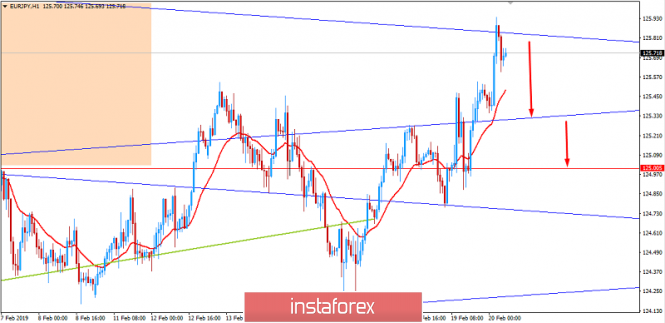EUR managed to gain ground against JPY despite the economic slowdown in the eurozone that explains weakness of JPY. JPY use to be the dominant currency in the pair throughout 2018 but this year EUR managed to gain certain momentum along the way which could be maintained in the short term.
The eurozone's downturn was mainly caused by recession in Italy, stagnation in Germany, and a downgraded economic outlook for the 19-nation euro area. According to investors, EUR is currently is quite near to the weakest point which was recorded in mid-2017. The ECB's sentiment is quite nervous nowadays which might lead to certain wrong steps along the way. If the regulator provides a better solution than the latest one suggested by President Draghi, EUR might win back some of its losses, though its stength is likely to be short-lived. Economic indicators have revealed downbeat performance. Moreover, EUR is expected to extend broad-based weakness as analysts warn about more disappointing economic data to follow.
A disorderly BREXIT is also expected to impact the eurozone's economy. The eurozone is currently facing economic headwinds. France and Germany are currently working on the plans to reform EU competition rules to encourage positive changes through mergers of corporations.
On the JPY side, Japan has been alert to the US-China trade talks as its outcome is sure to influence Japan's international trade efficiency. Japan is currently sticking to its view that the US won't impose higher tariffs on imports of Japanese cars and spare parts as long as the negotiations are undeway. As Japan's biggest industry is cars and auto parts, any tariff hike on these goods may undermine Japan's domestic economy. Recently Core Machinery Orders report was published positive with a slight decrease to -0.1% from the previous value of 0.0% which was expected to decrease more to -1.1%. Today Trade Balance report was published with a significant deficit to -0.37T from the previous figure of -0.22T which was expected to increase to 0.17T. The wider trade balance deficit indicates sluggish exports and imports that reflects lower foreign demand and waning momentum in Japan's industry.
Meanwhile, EUR has been quite confident with recent gains despite the economic slowdown, whereas the downbeat trade balance report from Japan confused market sentiment.
Now let us look at the technical view. The price recently rejected off the Gann Grid Line with strong bearish pressure which is expected to lead to medium-term bearish momentum towards 125.00 support area before it pushes higher again with the bullish trend with a target towards 128.50-130.00 resistance area in the future.

